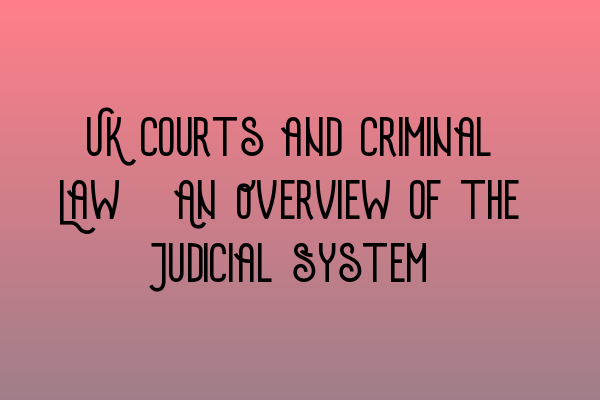UK Courts and Criminal Law: An Overview of the Judicial System
Welcome to SQE Criminal Law & Practice Law UK, where we provide comprehensive information and resources on the
UK courts and criminal law system. In this blog post, we aim to provide you with an overview of the judicial
system in the UK, along with key information about criminal law.
The UK Judicial System
The UK judicial system is a complex and dynamic network of courts and tribunals that work together to administer
justice. The system is hierarchical, meaning that certain courts have higher authority and jurisdiction over
others.
At the top of the pyramid is the Supreme
Court, which is the final court of appeal in the UK for both civil and criminal cases. It hears
appeals on points of law that are of public importance and deals with matters of legal significance.
Below the Supreme Court are two main types of courts: the Crown Court and the Magistrates’ Court.
The Crown Court
The Crown Court is responsible for hearing serious criminal cases, such as murder, rape, and robbery. It also
handles appeals from the Magistrates’ Court. The court consists of a judge and a jury, and it has the authority
to impose more severe punishments than the Magistrates’ Court.
If a person is charged with a serious offense, their case will be referred to the Crown Court for trial, where a
panel of 12 jurors will determine their guilt or innocence. It’s important to note that the Crown Court does not
deal with minor criminal offenses, which are primarily handled by the Magistrates’ Court.
The Magistrates’ Court
The Magistrates’ Court is the first point of contact for most criminal cases in the UK. It deals with a wide range
of offenses, including minor assaults, theft, and traffic violations. The court consists of a single district
judge or a panel of lay magistrates, who are not legally qualified but are trained volunteers.
In the Magistrates’ Court, the judge or the panel of magistrates decides the verdict and imposes appropriate
sentences. They also have the power to transfer more serious cases to the Crown Court for trial.
Criminal Law in the UK
Criminal law governs behavior that is considered harmful or threatening to society. It defines criminal offenses,
sets out their penalties, and establishes procedures for bringing offenders to justice.
In the UK, criminal offenses are categorized as either summary offenses or indictable offenses. Summary offenses
are minor offenses that are usually tried in the Magistrates’ Court, while indictable offenses are more serious
crimes that are often tried in the Crown Court.
It’s essential to understand the distinction between summary offenses and indictable offenses, as it determines
which court will hear the case and the potential penalties the offender may face.
Summary Offenses
Summary offenses, also known as “summary-only offenses,” are less severe criminal offenses that carry less severe
penalties. They are usually punishable by a fine, community service, or a maximum prison sentence of six months.
Examples of summary offenses include minor assault, shoplifting, and traffic violations.
Indictable Offenses
Indictable offenses, also known as “either-way offenses,” are more serious criminal offenses that carry higher
penalties. They are typically heard in the Crown Court, and the offender may choose whether to have a trial by
jury or a trial without a jury. Examples of indictable offenses include murder, rape, robbery, and drug
trafficking.
SRA SQE Exam Dates
If you are interested in pursuing a career in criminal law or any other area of law, it’s important to stay
updated on the latest exam dates set by the Solicitors Regulation Authority (SRA). The SRA SQE exam dates can be
found here.
By successfully passing the SQE exams, you can demonstrate your competence and readiness to enter the legal
profession.
SQE 1 and SQE 2 Preparation Courses
To excel in the SQE exams and secure a successful legal career, it’s crucial to receive the right preparation and
training. At SQE Criminal Law & Practice Law UK, we offer comprehensive SQE 1 preparation courses and SQE 2 preparation courses designed to help aspiring
solicitors achieve their goals.
Our courses cover all the necessary topics and provide extensive practice materials, including practice mocks FLK1 FLK2 and practice exam questions. Our
experienced tutors will guide you through the syllabus, helping you build the knowledge, skills, and confidence
required to succeed in the SQE exams.
Conclusion
The UK courts and criminal law system play a vital role in maintaining law and order and delivering justice to
society. Understanding the structure and workings of the judicial system is crucial for anyone interested in
pursuing a career in law or seeking justice.
At SQE Criminal Law & Practice Law UK, we aim to provide the resources and support necessary to help aspiring
solicitors navigate the intricacies of criminal law and succeed in their legal careers.
